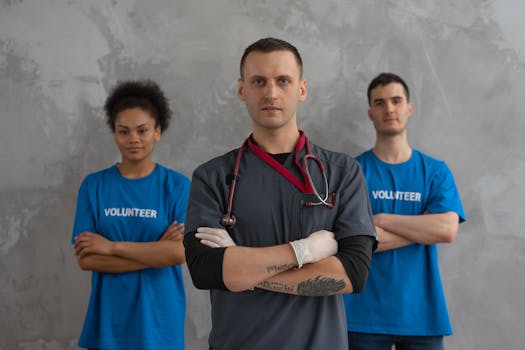You could do a foundation degree or degree in a subject like:
- education
- sociology
- youth work
- community development
Entry requirements
You'll usually need:
- 2 to 3 A levels, or equivalent, for a degree
A volunteer coordinator is responsible for recruiting, training, and supporting volunteers within an organisation, such as a charity, museum, or community group. The role involves advertising volunteer opportunities, interviewing and placing volunteers, and ensuring that they have a positive and rewarding experience. Volunteer coordinators also manage records, organise training sessions, and may be involved in planning events or projects that rely on volunteer support. Good people skills, strong organisation, and the ability to motivate others are essential in this career. The work often provides a sense of fulfilment, as coordinators play a vital part in helping organisations achieve their goals and support the community.

Volunteer coordinators in the UK typically earn between £20,000 and £30,000 per year, depending on experience and the size of the organisation.
There are around 6,000 active volunteer coordinator positions across the UK, with strong demand in the charity and non-profit sectors.
Most volunteer coordinators work around 35 to 40 hours per week, though some roles may require evening or weekend work to support events and volunteers.

Organises and manages volunteers within a hospital or healthcare setting, ensuring support for patients, staff, and visitors.

Oversees volunteers who work with children and young people, such as in after-school clubs, youth centres, or mentoring programmes.
Leads volunteers involved in environmental and conservation projects, including activities like tree planting, wildlife surveys, or community clean-ups.
Get involved in volunteering to understand how charities and community groups work.
Look for local charities, schools, or events where you can volunteer your time. This practical experience will give you insight into the needs of volunteers and the organisations that rely on them. It also demonstrates your commitment to helping others and gives you examples to use in future job applications.
Seek opportunities to lead or coordinate small groups of volunteers.
As you gain more experience, try to take on responsibilities such as organising volunteer rotas, helping with inductions, or leading a small project. These experiences show you have the skills needed to coordinate others and organise activities.
Focus on developing clear communication and strong organisational abilities.
Volunteer Coordinators need to be able to explain tasks, listen to concerns, and keep records. Practice these skills by helping to run events or working in customer service roles. Consider taking courses in communication, teamwork, or time management, either online or at college.
Consider studying for qualifications in volunteer management, community work, or a related field.
While a degree is not always required, courses in volunteer management, charity studies, or social care can be very helpful. You can find short courses through organisations like NCVO or local colleges. Some employers may look for GCSEs or A levels, while others value practical experience more.
Write a strong CV and cover letter highlighting your experience and skills.
Emphasise your volunteering background, leadership roles, and any formal qualifications. Tailor your application to each organisation, showing you understand their work and how you could help support their volunteers.
Look for Volunteer Coordinator vacancies in charities, councils, and community organisations.
Use job boards like CharityJob, local council websites, or the websites of large charities. Be prepared to start in a junior or assistant role if needed, and keep building your experience as you progress.
Explore relevant apprenticeships that can help you kickstart your career in Volunteer Coordinator. Apprenticeships offer hands-on experience and training while earning a wage.
This page showcases various career options and the pathways to reach them. Each career listed here shares transferable skills and knowledge, making it easier for individuals to transition between them.
Your current career is highlighted to help you see how it fits into the broader landscape of potential career choices. By clicking on any career, you can learn more about it, including the training and education required to pursue it.
Remember, progressing in your career often involves further learning and training. This page provides insights into future career options as well as those that can lead up to your current one.
These career progression decisions are informed by comparing the skills and knowledge needed for different occupations, along with data on how people move between them. Explore the possibilities and discover the exciting journey ahead in your career!
A Volunteer Coordinator and a Community Education Co-ordinator both require strong organisational and communication skills to manage programmes and engage with various stakeholders. Both roles involve planning, coordinating activities, and supporting community-based initiatives to achieve positive outcomes.
You can get into this job through:
You could do a foundation degree or degree in a subject like:
You'll usually need:
You could do a college course which might be useful when applying for a trainee job. Courses include:
Entry requirements for these courses vary.
You could start by doing a Level 3 Advanced Apprenticeship as a:
These apprenticeships can take around 1 year and 6 months to complete.
You'll usually need:
You could become a community education co-ordinator though volunteering.
Volunteering is a good way to get practical experience, meet new people and develop your network of contacts. This might help you when looking for a job in community education or development.
You can find volunteering opportunities through The National Council for Voluntary Organisations (NCVO) and Do It.
You could apply directly for community education co-ordinator jobs.
You'll need paid or voluntary experience of working in the community such as in:
You'll also find it helpful to have experience of working with disadvantaged or vulnerable groups.
You can find your local council to get more details about working in your community or learn about working in community education through Locality.
Explore other careers or use our AI to discover personalised paths based on your interests.
Address
Developing Experts Limited
Exchange Street Buildings
35-37 Exchange Street
Norwich
NR2 1DP
UK
Phone
01603 273515
Email
[email protected]
Copyright 2026 Developing Experts, All rights reserved.
Unlock expert-designed lessons, resources, and assessments tailored for educators. No credit card required.
Claim Your Free Trial →